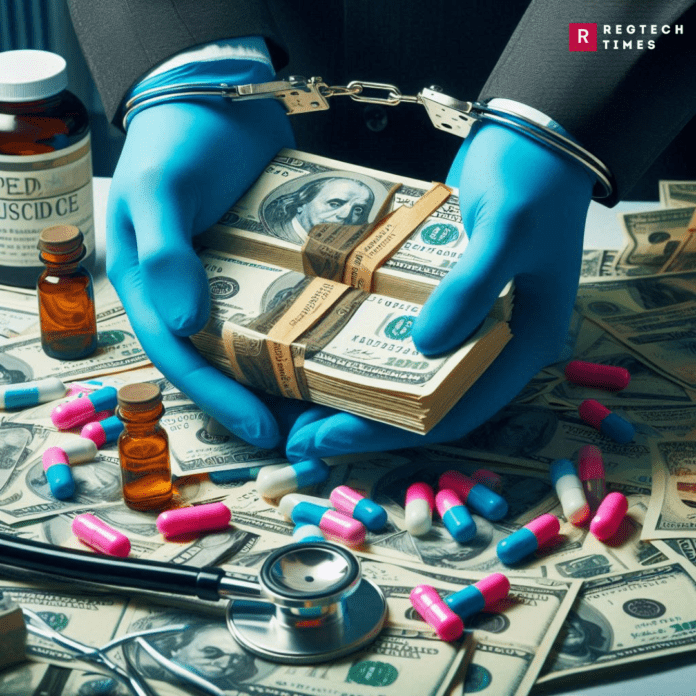The Department of Justice (DOJ) has unveiled the 2024 National Health Care Fraud Enforcement Action, a massive crackdown that led to criminal charges against 193 defendants, including 76 doctors, nurse practitioners, and other licensed medical professionals. These individuals are accused of participating in health care fraud schemes that involved approximately $2.75 billion in planned losses and resulted in $1.6 billion in actual losses.
Seizure of Assets
As part of this coordinated nationwide law enforcement action, the government, along with federal and state law enforcement partners, seized over $231 million in cash, luxury vehicles, gold, and other assets.
Statements from Key Officials
Attorney General Merrick B. Garland emphasized the DOJ’s commitment to holding accountable those who profit from the unlawful distribution of controlled substances, regardless of their position. “If you profit from the illegal distribution of restricted narcotics, you will be held responsible whether you are a corporate CEO, a drug cartel trafficker, or a medical professional in a health care company.” he stated.
Secretary of Homeland Security Alejandro N. Mayorkas praised the efforts of Homeland Security Investigations (HSI) in the operation, underscoring the collaborative effort of federal law enforcement in sending a strong message against health care fraud.
FBI Director Christopher Wray highlighted the impact of health care fraud on patients and health care programs, noting the FBI’s dedication to protecting vulnerable populations and ensuring that health care funds are used appropriately.
Key Charges and Schemes Unveiled
Amniotic Wound Grafts
In the District of Arizona, four individuals were charged with filing $900 million in false claims to Medicare for amniotic wound grafts. The defendants allegedly targeted elderly Medicare patients, many of whom were terminally ill, applying medically unnecessary and expensive grafts without proper treatment coordination. Medicare paid over $600 million to two defendants as a result of the fraud scheme.
Distribution of Adderall and Other Stimulants
Five defendants associated with Done Global Inc. were charged with unlawfully distributing millions of Adderall pills. The CEO and Clinical President of Done were previously charged for distributing Adderall over the internet, and the charges announced today include those against a nurse practitioner who prescribed over 1.5 million pills without proper patient interaction, often continuing prescriptions posthumously.
Diverted HIV Medication
Three owners and executives of a wholesale drug distributor were charged with a $90 million wire fraud conspiracy involving adulterated and misbranded HIV drugs. The defendants allegedly acquired these drugs through unlawful buyback schemes and resold them with falsified documentation, leading to patients receiving incorrect medications.
Addiction Treatment Fraud
These schemes involved paying kickbacks for patient referrals and billing for substandard or nonexistent services, often targeting vulnerable populations.
Telemedicine and Laboratory Fraud
Thirty-six defendants were charged with submitting more than $1.1 billion in fraudulent claims to Medicare via telemedicine schemes. These included paying illegal kickbacks for unnecessary genetic testing and minimal patient interactions. Such schemes have saved taxpayers billions through vigilant prosecution efforts.
Additional Health Care Fraud Schemes
Millions in fraudulent billings resulted from the illicit prescription and distribution of opioids, which led to the charges against 14 defendants. Another 126 defendants were charged with various health care fraud schemes, including fraudulent COVID-19 testing.
Coordinated Efforts and Future Commitment
The enforcement action was led by the Health Care Fraud Unit of the DOJ’s Fraud Section, in collaboration with U.S. Attorneys’ Offices, the Department of Health and Human Services Office of Inspector General (HHS-OIG), the FBI, and the DEA. The cases were investigated by agents from these core partner agencies, as well as other federal and state law enforcement agencies.
HHS Deputy Secretary Andrea Palm emphasized the importance of collaboration in fighting health care fraud, noting that those who steal from health care programs put patients at risk and raise the cost of care for all.
HHS-OIG Inspector General Christi A. Grimm highlighted the role of HHS-OIG in protecting taxpayer dollars and ensuring the safety of Americans from health-related harms.
CMS Administrator Chiquita Brooks-LaSure pointed out the significance of investigating fraud to sustain the Medicare program, noting that CMS took 127 administrative actions against providers involved in health care fraud schemes over the past six months.



